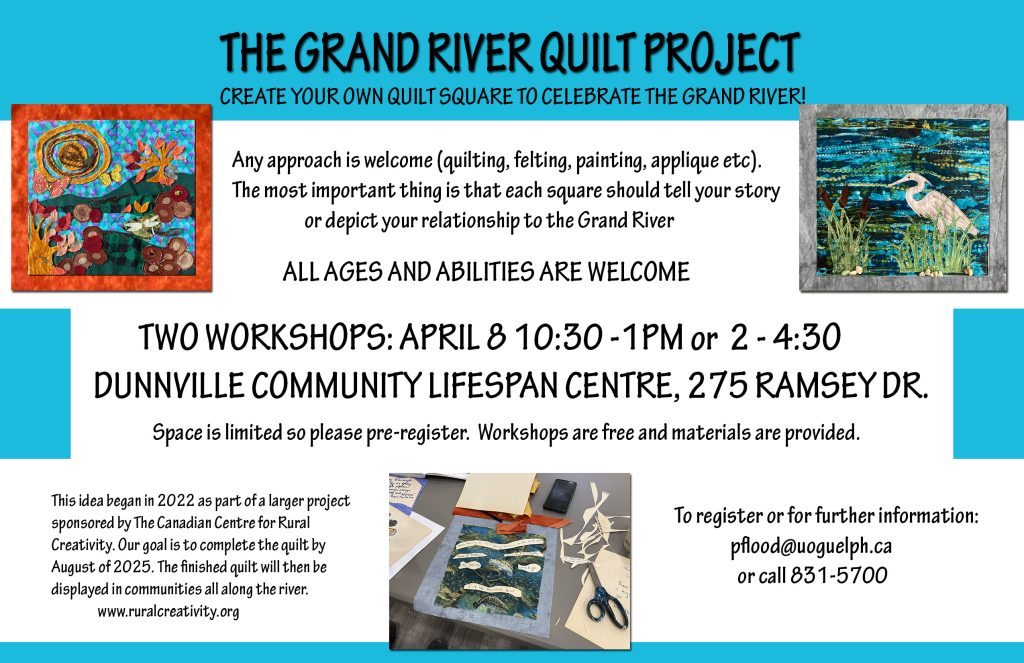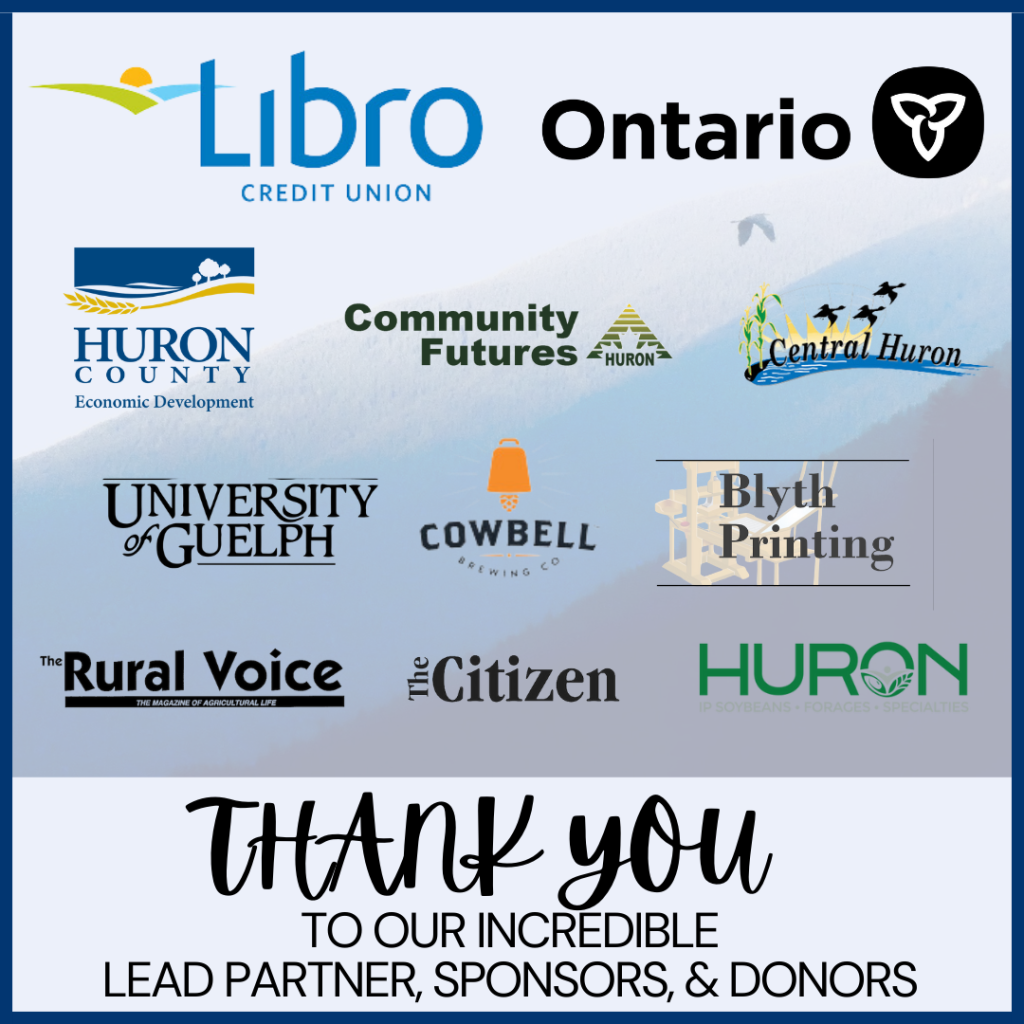Upcoming Quilt Workshop – April 8, 2025

We want to thank everyone who partook in R2R24 in October of last year in Blyth. It brought us to the Village to explore our differences together. Local documentarian Nick Vinnicombe from Walton put together a short documentary on the conference. We invite you to take a look and let us know what you think.
We believe in paying our artists and crew – so if you can offer your support – no matter how small or how large – it will assist us mightily. Your support goes toward compensating the incredible skills, talent and work of the artists and crew as well as key production equipment such as a portable stage and mobile sound and lighting.
Your donation, no matter how big or small, will make a difference. You also have the opportunity to sponsor a specific role or need whether it is the tour designer, puppet wrangler, stage manager, transportation or equipment.
How to make a donation or become a sponsor:
You will receive an automatic tax receipt via CanadaHelps.org
> Click here to go to the donation form OR use the QR code below

SPONSOR A SPECIFIC POSITION OR EQUIPMENT
To become a sponsor for a specific position or equipment (see list below), please contact Peter Smith directly at:
Email: peter@ruralcreativity.org
Tel: 416-686-1462
You will receive a mailed tax receipt for this option.
Here is a list of what is needed to support this incredible production. Your donation, large or small, will help us get to where we’re going.
> Click here to make a donation
| POSITION | DESCRIPTION | COST |
| Creatives/Artists | Actors, musicians, designers bring the stories alive and will be in rehearsals in the spring and summer leading to production in July/August. | $35,000 |
| Tour Manager | This is a critical position. Someone who will liaise with each community for permits, tickets, volunteers, performers from the community etc. Food, port-a-potties, recycling etc. | $5,000 |
| Costumer | Costume builder for the show who would then tour becoming the Assistant Stage Manager. This person also consults with each community to create “tickle trunks” for stories and parades. | $7,500 |
| Puppet Wrangler | This artist will create and oversee the props/banners for te show. They attend workshops and do follow up to ensure all puppets are finished. They also work to refurbish existing puppets and is a part of the tour team. | $5,000 |
| Mask Maker | Mask creator and advisor on costume, props and design. | $3,500 |
| Designer | Oversees all aspects of the production design. | $5,000 |
| POSITION | DESCRIPTION | COST |
| Stage Manager | Works to ensure smooth running of the production during performances. Works closely with the tech team in rehearsals, on tour. | $7,000 |
| Assistant Stage Manager | This person will help with the running of the show, actor wrangling, wardrobe, prop set-up and maintenance. | $5,000 |
| Production Manager/Tech Director | Ensures set up/tear down of all tech equipment. Responsible for safety. | $6,000 |
| Set, Light and Sound Technician | Crew member who responsible for set up lights and sound equipment and operations. | $5,000 |
| Driver | Drives the company truck from location to location. Ensures load ins and load outs. | $4,000 |
| EQUIPMENT | DESCRIPTION | COST |
| Portable Stage | A 20 ft wide and 16 ft deep, 18 inches high with 3 entrance/exit step units for stage right, left, and upstage. It will be made with all weather plywood sheets and aluminum and steel rigging. Easy to put up and to tear down. There will also be a colourful painted stage cloth attached to the stage on poles upstage. At the end of the run the stage will be gifted to Grandview Theatre in order for them to use it as they continue touring up and down the River for years to come. A good investment all around! | $10,000 |
| Mobile sound/lighting | We are using LED lighting with 10 instruments in total. They will be rigged on temporary poles/trees. The lights can change colour and change focus. We will be renting a lighting board for the run of the show. The sound equipment includes speakers, body mics, cable, a mixer and sound board that we will rent for the run. | $5,000 |
THANK YOU FOR YOUR SUPPORT!
Thanks to OntarioFarmer.com for the brilliant write-up on one of the communication-based workshop approaches – Appreciative Inquiry – at R2R24 in October.
Read full article – https://www.ontariofarmer.com/news/farm-news/story-trios-are-a-recommended-way-to-talk-out-differences
The CCRC has been hosting the Rural Talks to Rural conferences since 2016 to contribute to a strong rural voice through collaboration, dialogue, and building collective wisdom.
Appreciative Inquiry is based on the premise that all of us are stronger and smarter together and the solutions are already in our rural communities. It fosters and stimulates growth and celebrates the positive in the community. Delegates were asked to share when they were part of a conversation that crossed the divides in our rural communities that went well and what conditions made it possible.
Much came out of this workshop including these insights:
⭐Acknowledge change
⭐Embrace discomfort and have the courage to deal with it
⭐Practice patient communication and listening
⭐Have a willingness to understand differences
⭐Educate and inform
Listen to the 6-episode podcast series.
A collection of sounds, stories, interviews and observations from Rural Talks to Rural 2024 – Exploring Our Differences Together, narrated by host, Shauna Rae of Radar Media.
Wednesday, October 30, 2024
Rural Talks to Rural 2024 (R2R24) – October 16-18, 2024
EXPLORING OUR DIFFERENCES TOGETHER
press release
LISA THOMPSON, MINISTER of RURAL AFFAIRS for ONTARIO, WELCOMES THE WORLD TO THE VILLAGE OF BLYTH FOR R2R24
With gratitude and grace, the producers of the biennial Rural Talks to Rural (R2R) gathering wish to thank all who put shoulder to the wheel and who collectively brought the best of themselves to Blyth, Ontario, Canada to explore our differences together.
“You plan and plan,” R2R co-producers Casandra Bryant and Pete Smith said, “and you still don’t know how things will unfold. But as soon as we began an environment quickly developed that was at once rigorous, an exploration, a place to learn and share – with a whole lot of rural folks talking to rural folks about what matters most in their community.”
The conference opened with Austin Silversmith of Six Nations offering the Thanksgiving Address in Cayuga and English.
Our government values the diverse voices and perspectives that have made the Rural Talks to Rural Conference so impactful. Rural Ontario is a beautiful patchwork of unique communities and by working together we can turn any challenge into an opportunity,” says Lisa Thompson, Minister of Rural Affairs. “The documentary film, ‘Exploring Our Differences Together’, will be a great vehicle to showcase how diverse approaches can illuminate opportunities in our small communities throughout rural Ontario. I look forward to seeing this documentary generate positive outcomes across the province.” Warden Glenn McNeil then gave a warm and enthusiastic welcome on behalf of Huron County.
R2R connects art, science, agriculture, and local and Indigenous Knowledge and brings together folks from the local community, inviting those from across Canada and from overseas. This year we explored the conversations we should be having in our rural communities. Whether it’s in a keynote address, at a workshop, on a nature walk, over a meal, or in the art gallery, stories get told, and questions are asked about our directions of travel as we figure out the next steps. This was also informed by on-the-ground economic development planning, provincial programming, leading rural research, and local community work.
“So many exciting things happened over the three days of R2R24,” Casandra Bryant said. “The level of energy when coupled with the desire to learn, to do better, could be felt in the air. From Sheila Robson singing from the Bridge over Blyth Creek in full voice, to the telling of stories in the Art of Hosting workshop, we are energized to work together with our shared destiny of community.”
Media Contact: Peter Smith, peter@ruralcreativity.org, 226-501-4094

Lead Partner – Libro Credit Union
Main Sponsor – Ontario Government
General Sponsor – Huron County
General Sponsor – Community Futures Huron
General Sponsor – Central Huron
Youth Initiatives Sponsor – University of Guelph
Day 3 Lunch Sponsor – Cowbell Brewing Co.
In-Kind Sponsor – The Rural Voice & The Citizen
In-Kind Sponsor – Blyth Printing
Donor – Huron Commodities
Registration Sponsor for Two Delegates – W. Bill Dow
With a big heart, we share our thanks and gratitude to the organizations, companies, institutions, and individuals that sponsor the biennial Rural Talks to Rural (R2R) conference series.
Creativity, curiosity, and working to leave the campsite in better shape for the next crowd, lie at the heart of R2R. The conference continues to be at the intersection of art, science, and local knowledge. It brings people together to explore contemporary rural issues in an environment of respect and hope.
Thank you for your support in helping to create a place and space to ‘talk rural’ every two years in the heart of Huron County.
We welcome you to read more about every one of our partners, sponsors and donors >>
The CCRC is committed to contributing to a strong Canadian rural voice through collaboration, dialogue, and building collective wisdom. This year at the Rural Talks to Rural conference we provide a space and place to explore our differences together and highlight various formats on how we can listen, learn, and collaborate.
We are excited about our Pathways to Practice session showcasing projects, research, policy, and other initiatives in our rural communities, organizations, and learning centres.